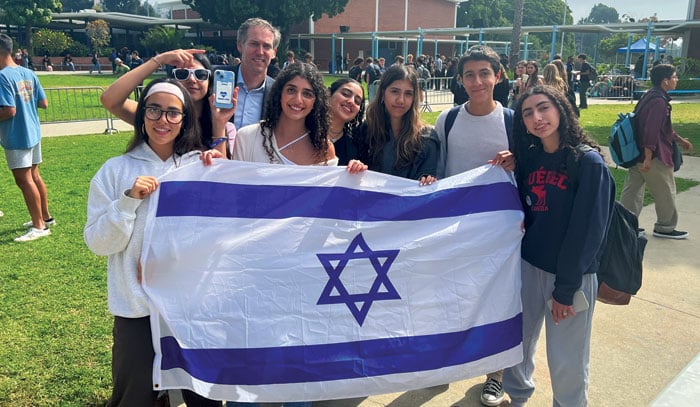I have spent the last two days at Marquette University participating in the Sport at the Service of Humanity Conference.
Posts by Rabbi Erez Sherman
Hineni
The first question in the Torah that God asks Adam is ayeka, where are you?
A Visit to Palisades High School
‘I have not set foot on a high school campus in many years. I interact often with teenagers at our synagogue. I consult with teens, give them the appropriate resources to combat antisemitism in the classroom and in the halls of their schools, and educate them on the history and the importance of Israel. After they become b’nai mitzvah, complete religious school or graduate Sinai Akiba Academy, we send these young people off to act as Jewish leaders in their high schools, private and public schools alike. If we are lucky, a small majority of teens stay active and deeply connected to synagogue life. It is the reality of the world.
Be a Dove
The families of the hostages set up an empty Shabbat table in Tel Aviv. The picture is haunting. 200 seats, each for one hostage that will not be at their Shabbat table tonight.
Light the Candles for Those Who Cannot
A cousin, a friend, a sibling, a child. There is not a Jew in the world who does not know someone who has been personally affected by the Simchat Torah massacre in the State of Israel. We try to awaken ourselves from the nightmare, but it is not yet possible.
It’s Time to Dance
For the last seven days, we have sat in our sukkot: big and small, tall and short. Our sukkot are filled with friends and family celebrating zman sinchateinu, our holy day of joy. Yes, we go outside in a fragile structure, but we are still protected by walls and a roof representing ananei kavod, God’s clouds of glory.
Sukkot is Confusing
Sukkot is confusing. Why are we sitting in huts commemorating the Exodus when we know this miracle happened in the spring?
Spiritual Biography
The Talmud debates who is greater: the tzaddik gammur, the fully righteous person, or the ba’al teshuva, the master of return.
Prepare to Arrive
Most children look forward to Chanukah and Passover, holy days with tangible rituals.
New Expectations
I entered the world of middle school parenthood this week. Back to school night overwhelmed us as teacher after teacher presented the expectations of how the year will proceed. Our children have grown up here in these hallways at Sinai Temple, yet it felt like I was in an entirely different place. I can imagine the Israelites in the desert as Moses retells the story of the people. At last, they arrive to the point where Moses presents them with the Torah, their covenant with one God. Moses explains that when they get to a certain point, they will write kol divrei hatorah hazot, the entire Torah on stones that they shall set up.



